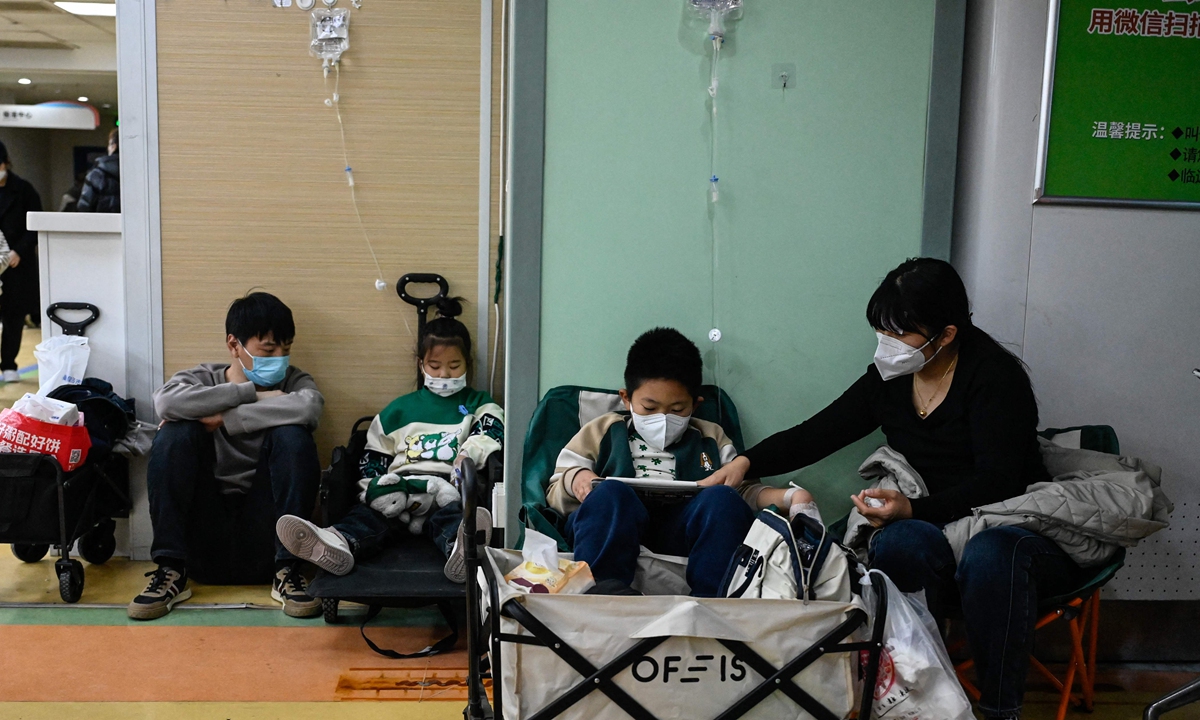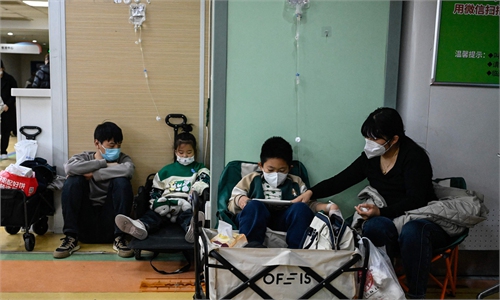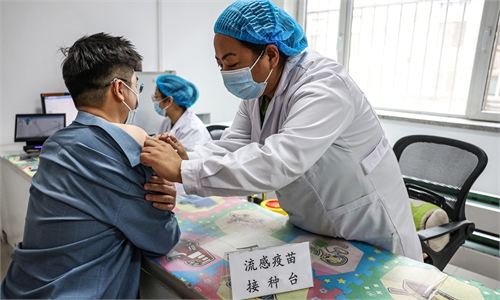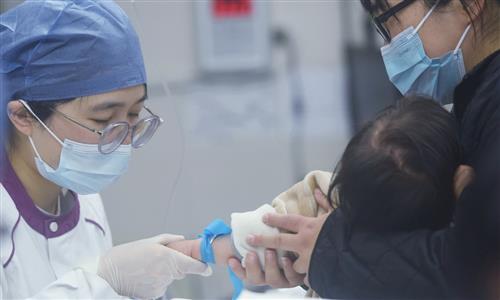
Sick children receive a drip at a children's hospital in Beijing on November 23, 2023. Photo: VCG
Grassroots medical and health institutions at all levels should be fully accessible to children and must not refuse treatment, China's National Health Commission (NHC) stated in a notice guiding healthcare institutions nationwide to deliver quality respiratory disease healthcare services during the winter and spring seasons, according to media reports on Monday.
The notice emphasizes the need to proactively explore resources and enhance pediatric medical services. All levels of grassroots healthcare institutions must be fully accessible to children, and refusal of treatment is strictly prohibited. Furthermore, a prompt dissemination of a comprehensive list, map, or navigation information for primary healthcare institutions offering pediatric services within their jurisdiction is required. This should clearly specify the location, operational hours, contact number, and available services, facilitating the public in locating and utilizing primary pediatric medical services.
For urban community health service centers experiencing high service demand, the notice recommends extending pediatric medical services by one to three hours on weekdays. Alternatively, considering additional clinic hours on Saturdays and Sundays may also be explored to facilitate children's medical visits.
The NHC also specified that grassroots medical and health institutions should be directed to facilitate the establishment of independent pediatric clinics or designated areas. These institutions should streamline and optimize the medical consultation process, minimize consultation time, standardize clinic and infusion room disinfection, and ensure prompt ventilation and cleanliness.
Grassroots institutions should mobilize general practitioners trained in pediatric diagnosis and treatment to deliver pediatric medical services according to their capabilities, strengthening early identification and diagnosis of respiratory diseases in children and providing timely guidance for the referral of critically ill children.
Furthermore, the inherent attributes of simplicity, convenience, effectiveness, and affordability in traditional Chinese medicine (TCM) should be harnessed to formulate TCM prevention and treatment strategies, ensuring tailored services for children.
The NHC also emphasized the need to enhance support for primary healthcare institutions from comprehensive hospitals. Comprehensive hospitals should allocate a specific proportion of outpatient appointments to be prioritized for primary healthcare institutions, enabling them to offer comprehensive hospital pediatric outpatient services to residents within their jurisdiction.
Moreover, the notice recommends utilizing telemedicine or internet healthcare to efficiently redirect pediatric patients, guiding them to seek initial and follow-up consultations at nearby primary healthcare institutions. Comprehensive hospitals should designate personnel to deliver remote medical services or conduct online consultations.
The NHC emphasized the crucial role of family doctors. Priority groups meeting vaccination criteria should be directed to receive vaccines for influenza, COVID-19, pneumonia, and other diseases. Family doctors should promptly address the health consultation needs of contracted residents through telephone, WeChat, and the internet.
The notice also underscores the importance of ensuring the efficient functioning of fever clinics in primary healthcare institutions and the provision of materials for respiratory disease prevention and control during the winter and spring seasons. Additionally, it calls for enhanced training on pediatric care and the diagnosis and treatment capabilities of respiratory diseases for grassroots healthcare workers.
The NHC said that localities should focus on the characteristics of respiratory diseases during the winter and spring seasons and conduct extensive prevention and health education using various forms.
According to Hong Kong media reports on Monday, China's top respiratory disease expert Zhong Nanshan, who was attending an event in Hong Kong, said that there is currently no evidence of a more pathogenic new virus appearing in recent outbreaks of upper respiratory tract infections. He stated that as we enter the winter season, especially in southern China, there is an increase in cases of respiratory tract infections, with children being the main patients.
Zhong noted that it is correct to encourage the wearing of masks in schools with a higher number of infected individuals.
As for individual cases of COVID-19 infection, Zhong predicted that there will be a small peak from last month to January next year, involving three XBB variant strains of the virus, which have strong transmissibility. However, due to the vaccination, the infection rate is not considered high. He urged the elderly and other high-risk individuals to get booster shots as soon as possible. Otherwise, once infected or if complications worsen, it will increase the risk of death.
Global Times



